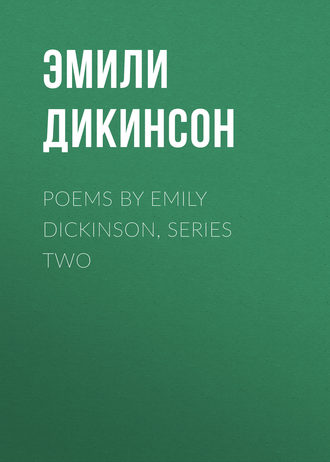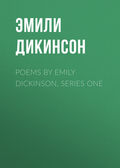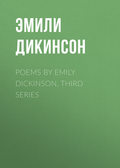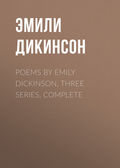полная версия

Эмили Дикинсон
Poems by Emily Dickinson, Series Two
XIV.
IN SHADOW
I dreaded that first robin so,
But he is mastered now,
And I 'm accustomed to him grown, —
He hurts a little, though.
I thought if I could only live
Till that first shout got by,
Not all pianos in the woods
Had power to mangle me.
I dared not meet the daffodils,
For fear their yellow gown
Would pierce me with a fashion
So foreign to my own.
I wished the grass would hurry,
So when 't was time to see,
He 'd be too tall, the tallest one
Could stretch to look at me.
I could not bear the bees should come,
I wished they 'd stay away
In those dim countries where they go:
What word had they for me?
They 're here, though; not a creature failed,
No blossom stayed away
In gentle deference to me,
The Queen of Calvary.
Each one salutes me as he goes,
And I my childish plumes
Lift, in bereaved acknowledgment
Of their unthinking drums.
XV.
THE HUMMING-BIRD
A route of evanescence
With a revolving wheel;
A resonance of emerald,
A rush of cochineal;
And every blossom on the bush
Adjusts its tumbled head, —
The mail from Tunis, probably,
An easy morning's ride.
XVI.
SECRETS
The skies can't keep their secret!
They tell it to the hills —
The hills just tell the orchards —
And they the daffodils!
A bird, by chance, that goes that way
Soft overheard the whole.
If I should bribe the little bird,
Who knows but she would tell?
I think I won't, however,
It's finer not to know;
If summer were an axiom,
What sorcery had snow?
So keep your secret, Father!
I would not, if I could,
Know what the sapphire fellows do,
In your new-fashioned world!
XVII
Who robbed the woods,
The trusting woods?
The unsuspecting trees
Brought out their burrs and mosses
His fantasy to please.
He scanned their trinkets, curious,
He grasped, he bore away.
What will the solemn hemlock,
What will the fir-tree say?
XVIII.
TWO VOYAGERS
Two butterflies went out at noon
And waltzed above a stream,
Then stepped straight through the firmament
And rested on a beam;
And then together bore away
Upon a shining sea, —
Though never yet, in any port,
Their coming mentioned be.
If spoken by the distant bird,
If met in ether sea
By frigate or by merchantman,
Report was not to me.
XIX.
BY THE SEA
I started early, took my dog,
And visited the sea;
The mermaids in the basement
Came out to look at me,
And frigates in the upper floor
Extended hempen hands,
Presuming me to be a mouse
Aground, upon the sands.
But no man moved me till the tide
Went past my simple shoe,
And past my apron and my belt,
And past my bodice too,
And made as he would eat me up
As wholly as a dew
Upon a dandelion's sleeve —
And then I started too.
And he – he followed close behind;
I felt his silver heel
Upon my ankle, – then my shoes
Would overflow with pearl.
Until we met the solid town,
No man he seemed to know;
And bowing with a mighty look
At me, the sea withdrew.
XX.
OLD-FASHIONED
Arcturus is his other name, —
I'd rather call him star!
It's so unkind of science
To go and interfere!
I pull a flower from the woods, —
A monster with a glass
Computes the stamens in a breath,
And has her in a class.
Whereas I took the butterfly
Aforetime in my hat,
He sits erect in cabinets,
The clover-bells forgot.
What once was heaven, is zenith now.
Where I proposed to go
When time's brief masquerade was done,
Is mapped, and charted too!
What if the poles should frisk about
And stand upon their heads!
I hope I 'm ready for the worst,
Whatever prank betides!
Perhaps the kingdom of Heaven 's changed!
I hope the children there
Won't be new-fashioned when I come,
And laugh at me, and stare!
I hope the father in the skies
Will lift his little girl, —
Old-fashioned, naughty, everything, —
Over the stile of pearl!
XXI.
A TEMPEST
An awful tempest mashed the air,
The clouds were gaunt and few;
A black, as of a spectre's cloak,
Hid heaven and earth from view.
The creatures chuckled on the roofs
And whistled in the air,
And shook their fists and gnashed their teeth.
And swung their frenzied hair.
The morning lit, the birds arose;
The monster's faded eyes
Turned slowly to his native coast,
And peace was Paradise!
XXII.
THE SEA
An everywhere of silver,
With ropes of sand
To keep it from effacing
The track called land.
XXIII.
IN THE GARDEN
A bird came down the walk:
He did not know I saw;
He bit an angle-worm in halves
And ate the fellow, raw.
And then he drank a dew
From a convenient grass,
And then hopped sidewise to the wall
To let a beetle pass.
He glanced with rapid eyes
That hurried all abroad, —
They looked like frightened beads, I thought;
He stirred his velvet head
Like one in danger; cautious,
I offered him a crumb,
And he unrolled his feathers
And rowed him softer home
Than oars divide the ocean,
Too silver for a seam,
Or butterflies, off banks of noon,
Leap, plashless, as they swim.
XXIV.
THE SNAKE
A narrow fellow in the grass
Occasionally rides;
You may have met him, – did you not,
His notice sudden is.
The grass divides as with a comb,
A spotted shaft is seen;
And then it closes at your feet
And opens further on.
He likes a boggy acre,
A floor too cool for corn.
Yet when a child, and barefoot,
I more than once, at morn,
Have passed, I thought, a whip-lash
Unbraiding in the sun, —
When, stooping to secure it,
It wrinkled, and was gone.
Several of nature's people
I know, and they know me;
I feel for them a transport
Of cordiality;
But never met this fellow,
Attended or alone,
Without a tighter breathing,
And zero at the bone.
XXV.
THE MUSHROOM
The mushroom is the elf of plants,
At evening it is not;
At morning in a truffled hut
It stops upon a spot
As if it tarried always;
And yet its whole career
Is shorter than a snake's delay,
And fleeter than a tare.
'T is vegetation's juggler,
The germ of alibi;
Doth like a bubble antedate,
And like a bubble hie.
I feel as if the grass were pleased
To have it intermit;
The surreptitious scion
Of summer's circumspect.
Had nature any outcast face,
Could she a son contemn,
Had nature an Iscariot,
That mushroom, – it is him.
XXVI.
THE STORM
There came a wind like a bugle;
It quivered through the grass,
And a green chill upon the heat
So ominous did pass
We barred the windows and the doors
As from an emerald ghost;
The doom's electric moccason
That very instant passed.
On a strange mob of panting trees,
And fences fled away,
And rivers where the houses ran
The living looked that day.
The bell within the steeple wild
The flying tidings whirled.
How much can come
And much can go,
And yet abide the world!
XXVII.
THE SPIDER
A spider sewed at night
Without a light
Upon an arc of white.
If ruff it was of dame
Or shroud of gnome,
Himself, himself inform.
Of immortality
His strategy
Was physiognomy.
XXVIII
I know a place where summer strives
With such a practised frost,
She each year leads her daisies back,
Recording briefly, "Lost."
But when the south wind stirs the pools
And struggles in the lanes,
Her heart misgives her for her vow,
And she pours soft refrains
Into the lap of adamant,
And spices, and the dew,
That stiffens quietly to quartz,
Upon her amber shoe.
XXIX
The one that could repeat the summer day
Were greater than itself, though he
Minutest of mankind might be.
And who could reproduce the sun,
At period of going down —
The lingering and the stain, I mean —
When Orient has been outgrown,
And Occident becomes unknown,
His name remain.
XXX.
THE WlND'S VISIT
The wind tapped like a tired man,
And like a host, "Come in,"
I boldly answered; entered then
My residence within
A rapid, footless guest,
To offer whom a chair
Were as impossible as hand
A sofa to the air.
No bone had he to bind him,
His speech was like the push
Of numerous humming-birds at once
From a superior bush.
His countenance a billow,
His fingers, if he pass,
Let go a music, as of tunes
Blown tremulous in glass.
He visited, still flitting;
Then, like a timid man,
Again he tapped – 't was flurriedly —
And I became alone.
XXXI
Nature rarer uses yellow
Than another hue;
Saves she all of that for sunsets, —
Prodigal of blue,
Spending scarlet like a woman,
Yellow she affords
Only scantly and selectly,
Like a lover's words.
XXXII.
GOSSIP
The leaves, like women, interchange
Sagacious confidence;
Somewhat of nods, and somewhat of
Portentous inference,
The parties in both cases
Enjoining secrecy, —
Inviolable compact
To notoriety.
XXXIII.
SIMPLICITY
How happy is the little stone
That rambles in the road alone,
And does n't care about careers,
And exigencies never fears;
Whose coat of elemental brown
A passing universe put on;
And independent as the sun,
Associates or glows alone,
Fulfilling absolute decree
In casual simplicity.
XXXIV.
STORM
It sounded as if the streets were running,
And then the streets stood still.
Eclipse was all we could see at the window,
And awe was all we could feel.
By and by the boldest stole out of his covert,
To see if time was there.
Nature was in her beryl apron,
Mixing fresher air.
XXXV.
THE RAT
The rat is the concisest tenant.
He pays no rent, —
Repudiates the obligation,
On schemes intent.
Balking our wit
To sound or circumvent,
Hate cannot harm
A foe so reticent.
Neither decree
Prohibits him,
Lawful as
Equilibrium.
XXXVI
Frequently the woods are pink,
Frequently are brown;
Frequently the hills undress
Behind my native town.
Oft a head is crested
I was wont to see,
And as oft a cranny
Where it used to be.
And the earth, they tell me,
On its axis turned, —
Wonderful rotation
By but twelve performed!
XXXVII.
A THUNDER-STORM
The wind begun to rock the grass
With threatening tunes and low, —
He flung a menace at the earth,
A menace at the sky.
The leaves unhooked themselves from trees
And started all abroad;
The dust did scoop itself like hands
And throw away the road.
The wagons quickened on the streets,
The thunder hurried slow;
The lightning showed a yellow beak,
And then a livid claw.
The birds put up the bars to nests,
The cattle fled to barns;
There came one drop of giant rain,
And then, as if the hands
That held the dams had parted hold,
The waters wrecked the sky,
But overlooked my father's house,
Just quartering a tree.





